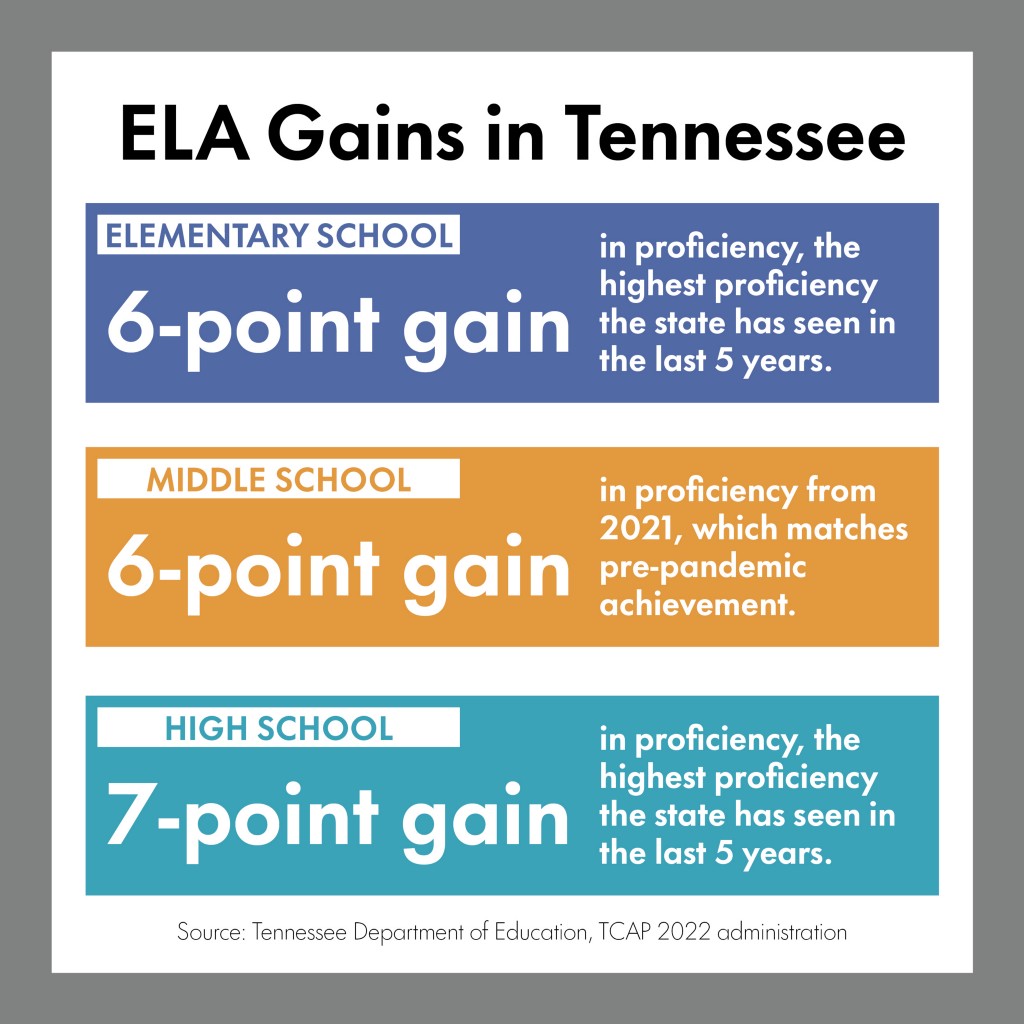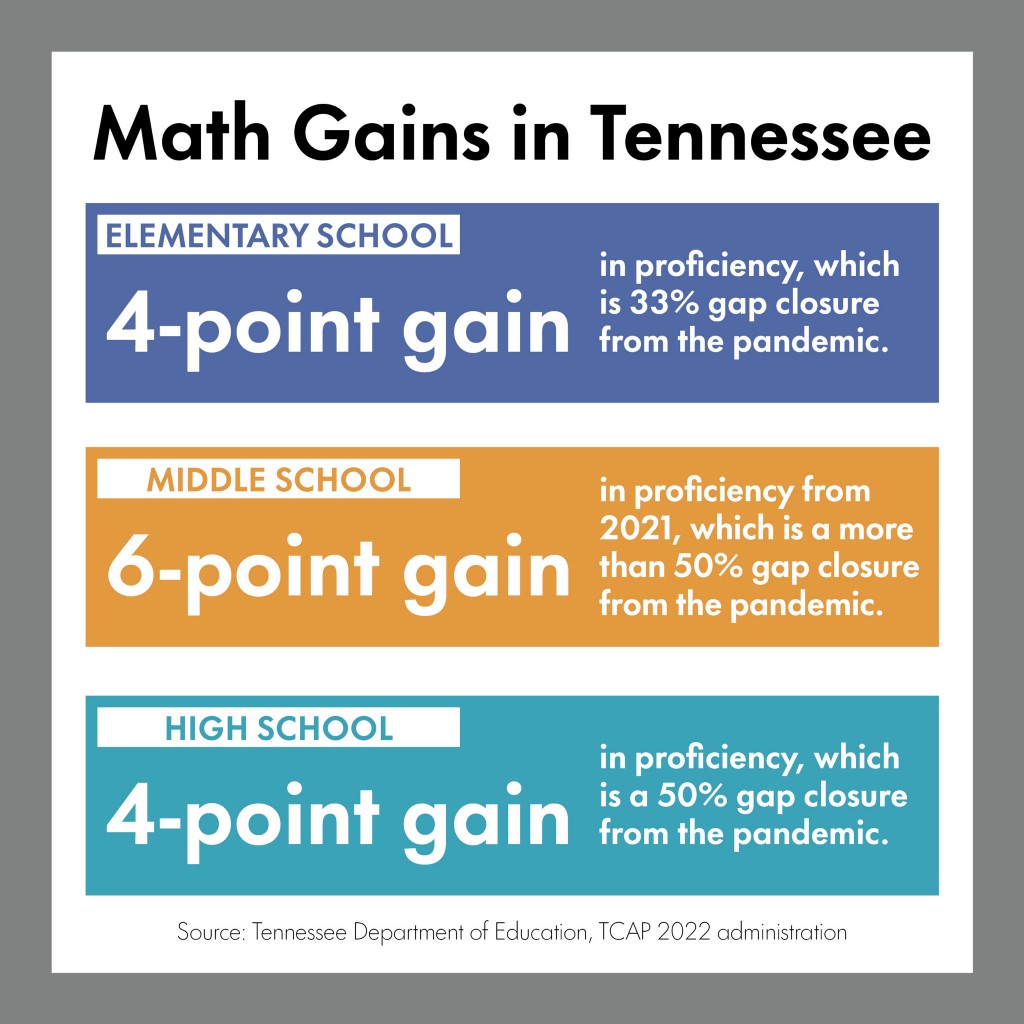By Bryan Johnson, chief in residence at Chiefs for Change and former superintendent of Hamilton County Schools in Chattanooga, Tennessee.
For nearly two years, Americans have worried about how children will recover from the disruptions and learning time lost during the pandemic. Initial reports were alarming, but we are beginning to see signs of hope.
One bright spot is my home state of Tennessee. Results of the state tests that third through eighth graders took in the spring, as well as end-of-course exams for high school students, show increases across all grades in English language arts (ELA) and math. An especially encouraging sign is that the number of students who are proficient in ELA has returned to pre-COVID levels across nearly all grades. Take a look:

And here is a closer look at the scores in math.

These results speak to all of the hard work that students, teachers, principals, other staff, and families have been doing every day. As the former superintendent of Hamilton County Schools in Chattanooga, I saw over and over again how our team went the extra mile, even when faced with great challenges, the likes of which we had never experienced before.
The progress is also a testament to the leadership of Tennessee Education Commissioner Penny Schwinn and her team at the Department of Education. The department has taken a number of important steps that I believe contributed to the recent progress.
First, Tennessee was committed to bringing students back into the classroom in person because it was clear then — as it is now — that school is the best place for students to learn, including during a pandemic. Millions of dollars in emergency aid supported safe reopenings. District leaders used the Department of Education’s toolkits to help make sound decisions, and a statewide dashboard allowed us to track the supply and delivery of protective equipment like masks and sanitizer.
Second, during a special session in 2021, the state legislature approved a robust package of education measures. These included new requirements for teaching children how to read using a phonics-based approach, so kids build foundational literacy skills. Now, every kindergarten through third grade student will take a screening test three times a year to see what supports they may need. If the screening shows a child has trouble reading on grade level, their school will create a personalized report so their family understands where more help is needed. The school also will provide optional activities that families can do together at home, and all teachers receive training in the science of reading.
Here is a video from Chiefs for Change on the state’s Reading 360 initiative.
Third, every district in the state now offers summer camps for children in first through fifth grade. The camps provide six hours of instruction, five days a week, for six weeks. Learning loss bridge camps are also available. They provide the same level of instruction, but for four weeks, and are open to children entering fourth through eighth grade.
Fourth, the Department of Education invested $200 million in federal funds to support high-dosage, low-ratio tutoring in more than 80 school districts through the Tennessee Accelerating Literacy and Learning Corps (TN ALL Corps). You can learn more about the tutoring programs in Tennessee in this Chiefs for Change video.
Commissioner Schwinn is a member of Chiefs for Change. I serve as a chief in residence for the network, which has produced a number of free resources to support K-12 systems. One such resource is a tutoring guidebook, modeled after Tennessee’s approach, designed to help systems launch successful tutoring programs in collaboration with community partners. The guide includes a capacity calculator to assist systems in determining how many tutors are needed, sample criteria for identifying potential tutors, and sample tutoring schedules. There is also information about logistics, funding considerations, curricula selection, and how to track and determine whether a program is effective.
Several of my fellow chiefs in residence have supported state education departments and school districts in using the tutoring guidebook and other materials. Chiefs for Change’s technical assistance partners have also worked with K-12 systems to customize the resources for their specific needs. As one example, in Mississippi, these partners worked with the state Department of Education, under the leadership of Chiefs for Change member and former Superintendent Carey Wright, to create guides for all school districts that include information on grant funding for tutoring initiatives.
Through tutoring, accelerated summer learning, literacy instruction grounded in the science of reading, and a commitment to keeping school doors open, Tennessee is not just helping students recover from the pandemic but is building a stronger system for the future. None of this work would be possible without the tireless efforts of the outstanding teachers across the state. For our teachers, working with kids is a calling. Despite all of the challenges of the pandemic, teachers kept showing up for kids, finding creative ways to stay connected and ensure learning continued. I am so grateful for their personal sacrifices and fierce commitment to Tennessee’s young people.
While there is still much more to do, the actions that teachers, families, and leaders have taken–along with students’ own hard work–are making a difference in our state. Together, we must build on that progress.